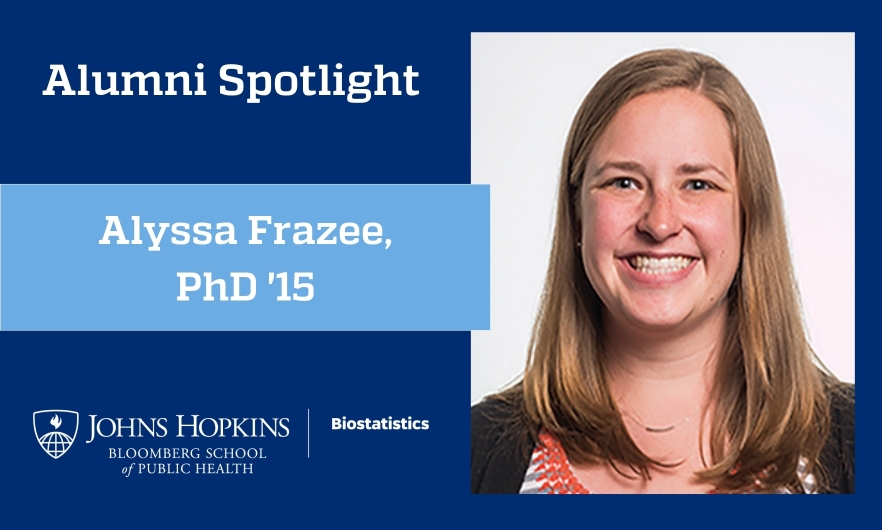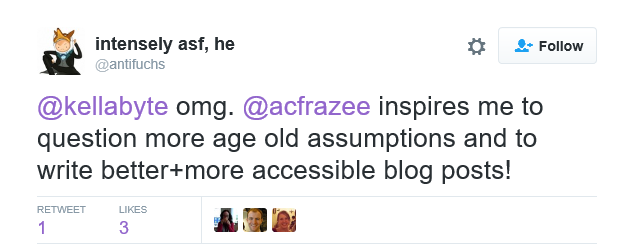Alyssa Frazee, PhD '15
Alyssa Frazee, PhD '15, shares her experience as a PhD student and her career working as a Machine Learning Engineer.

Alyssa Frazee, PhD '15, is currently a Machine Learning Engineer at Stripe. Her thesis, under the direction of Jeffrey Leek, was entitled, "High-Resolution Gene Expression Analysis".
Alyssa represents the students and researchers exploring the field of data science, a relatively new area of statistics. She writes, "Being open to exploring new fields that pop up can be hugely rewarding, and doing a PhD at Hopkins is a great way to be exposed to those new fields."
Alyssa recently shared her thoughts on her career and time spent in the Department through an interview.
How did you get interested in the field of biostatistics? What was your background before enrolling at Hopkins?
I chose to study biostatistics after I graduated from college with a math degree because I wanted to solve useful problems using my math and puzzle-solving skills and analyzing public health data is such an awesome way to do that.
How did Johns Hopkins Biostatistics prepare you for your career? What aspects of the program did you find most useful?
My time in grad school was hugely helpful for what I’m currently doing in my job. First, statistics and programming are two big components of data science jobs, so the software projects I worked on for my thesis are directly relevant to what I do day-to-day at my current job. Second, spending time doing a PhD meant spending time doing research, which meant spending time solving problems nobody has ever solved before, which has made me pretty comfortable working on problems we (as an industry) don’t quite know the answers to yet. In research, we eventually figure out how to move forward, and spending time wading through the confusing darkness generally pans out in the end, even though it might not seem like it — having this background makes me pretty good at persevering in the face of tough problems. It has also been really interesting to see how biology and public health perspectives play into different data science applications. For example: I work on credit card fraud detection, but public health principles like understanding the roles of prevention and remediation and evaluating solutions on an individual vs. population level have definitely framed my thinking around how to build effective fraud prevention systems.
What are your favorite memories of your time at Johns Hopkins Biostatistics?
Honestly my favorite parts of grad school were bonding with my friends and my advisor. I remember so many specific times that we pumped each other up, helped each other through hard research problems, encouraged each other to finish the paper or the blog post or the simulation, or went out to celebrate a victory (big or small!).
What advice would you give to prospective students?
Keep your eyes open for exciting opportunities! The company I’ve been working at since graduation hadn’t even been founded when I started grad school. The term “data scientist” had barely been invented. Being open to exploring new fields that pop up can be hugely rewarding, and doing a PhD at Hopkins is a great way to be exposed to those new fields. The faculty and students are working on cutting edge stuff, so developing your skills there while staying aware of what’s going on outside of Hopkins will probably show you that there are lots of opportunities out there for a person with your skill set.
Describe your current position and responsibilities in a way that will inform prospective students about career opportunities in Biostatistics.
I work on machine learning at Stripe, a company that builds software allowing online businesses to accept credit card payments. Since Stripe is a payments company, we have to deal with fraud, so the machine learning team primarily works on the part of Stripe software that estimates a charge’s probability of being fraud and either allows or declines the charge based on that probability. My responsibilities specifically involve proposing improvements to our fraud detection systems, predicting the effectiveness of those improvements, and adding those improvements to Stripe’s production software if we decide they will help us prevent fraud on behalf of our users. Building and evaluating classifier models is a really common problem in biostatistics, so even though the application isn’t health-related, it’s extremely relevant to many of the principles biostatistics students study extensively.
Can you describe your day-to-day life?
I work pretty regular hours (9-6:30). Those hours are generally filled with a mix of meetings (either 1:1 with coworkers or my manager, or larger team meetings), software engineering work (adding code to Stripe’s production infrastructure), and data analysis (e.g., determining our fraud model performance or evaluating whether a proposed charge pattern is truly indicative of fraud on a large scale). I also review code written by my team members, do some project management work (task delegation, goal setting, prioritization), and conduct interviews for new team members.
What has been your most satisfying job experience using your biostatistics background?
I once helped a coworker understand the data from his software system using the “probability integral transform,” a technique I studied for my first-year comps :) More seriously, I’ve been the leader in terms of understanding the metrics we use to evaluate our classifiers and measuring the uncertainty around our performance estimates, and I’ve really enjoyed leading those efforts that are based in foundational biostatistical knowledge.
What about your experience at Hopkins that would be useful for prospective students and/or helping current students? This can include your experience in Baltimore.
The first two years are really hard, and third year is interesting because transitioning from coursework to lots of unstructured free research time is really weird. My advice is to find a supportive advisor that you like and who believes in you, stick with it (as long as you’re reasonably happy), and use the opportunity to learn as much as you can. Research can be really exhausting, so find an advisor and a subject area that you’re enthusiastic about so you’ll be able to trudge through the hard parts to an ending (of the paper or project) that’s really satisfying.
Please list any notable accomplishments that you would like us to highlight.
Honestly, I think this tweet from my coworker best illustrates what I’m proud of since graduation:

I was delighted to see a coworker complimenting my assumption-questioning (which I’m sure is related to my biostats background) and blog posts (which I’m sure is related to my advisor, Jeff Leek, who is an extremely accessible writer). This was on a thread asking for “inspirational women in engineering.” I consider “inspiring a coworker” a pretty great accomplishment for year 1!
